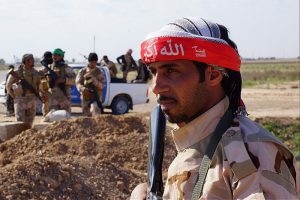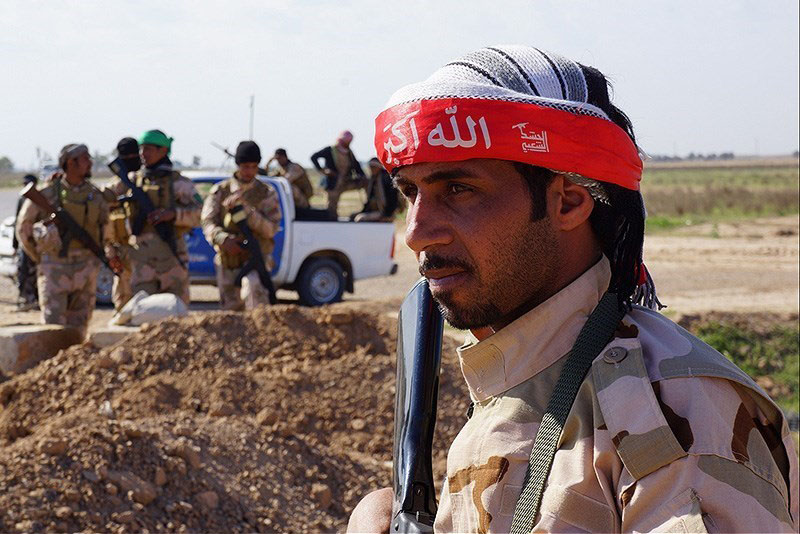
A Popular Mobilization fighter. Taken by Ahmad Shamloo Fard/Tasnim News Agency
Fallujah, located 40 miles west of Iraq’s capital, Baghdad, has long been known as the “city of mosques.”
But since its capture by the Islamic State in Iraq and the Levant (ISIL), Shia militias fighting to take the predominantly Sunni city have bestowed other epithets on Fallujah. One militia leader compared it to a “tumor” to be eradicated. On social media sites, supporters of offensives to seize Fallujah have often described the city as “Fallujah the whore.” Saraya Ansar al-Aqeeda, one of the many Shia armed groups taking part in the fight against ISIL, referred to Fallujah as a “cursed” city, and vowed to “turn [Fallujah’s] night into day, in revenge for the blood of the martyrs” killed there by ISIL. Hadi al-Amiri, the leader of the powerful, Iranian-backed Badr Organization militia, described the city as a “nest of traitors and criminals.”
Some militias have sought to frame the battle in sectarian terms. For example, one video depicts rockets intended for Fallujah that have been painted with the word “Nimr” – referring to Nimr al-Nimr, the Shia cleric executed by Saudi Arabia earlier this year.
Fallujah has also been called the “head of the snake,” given that it is believed to be a staging ground for the bombings that frequently rock Baghdad. Over the course of one week last month, eight bombing attacks killed almost 200 people in the capital. The first Iraqi city to fall under ISIL control, Fallujah has long had a reputation for insurgency, and was a hotbed of resistance to the US military presence in Iraq.
The question is whether Fallujah and the estimated 90,000 civilians remaining there will be decimated as well.
Given the sheer number of fighters and firepower on the side of the Iraqi government and allied militias, the latest offensive to take the city, launched on May 23, will likely end in ISIL’s defeat. The question is whether Fallujah and the estimated 90,000 civilians remaining there will be decimated as well.
Although the fight against ISIL is nominally led by the Iraqi government, Shia militias funded and supplied by Iran are playing a major role. Many of these armed groups have been accused of abuses in Sunni-majority areas they have taken from ISIL, such as looting, abductions, and extrajudicial killings. Reports indicate that similar abuses have been occurring near Fallujah in recent weeks.
Fallujah’s residents have suffered greatly under ISIL’s rule, and the group has been shooting civilians trying to flee the city. Yet the fact that opprobrium is being heaped not only on ISIL, but on Fallujah itself, does not bode well for how the city and its residents will be treated following ISIL’s defeat.
Yet given the militias’ political clout, and the prime minister’s weakness, Abadi’s ability to set the tone will likely continue to be circumscribed.
Iraqi Prime Minister Haider al-Abadi has used inclusive language to frame the Fallujah offensive, and has dissociated himself from certain militia leaders’ rhetoric. Yet given the militias’ political clout, and the prime minister’s weakness, Abadi’s ability to set the tone will likely continue to be circumscribed.
For the Iraqi government, a victory in the ongoing offensive could prove to be pyrrhic in the long run, if it further polarizes the country along sectarian lines – and if the battle for Fallujah comes to be perceived as a battle against Fallujah.
